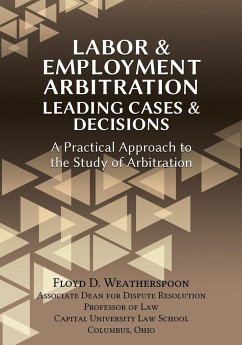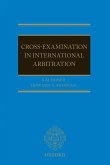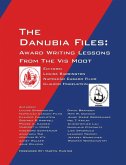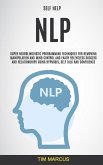This casebook presents material which both students and practitioners will find useful in analyzing, writing, and interpreting arbitration awards and cases. Unlike the traditional casebook, there are less theoretical concepts and historical developments. Instead, the book includes a broad collection of arbitration court cases and arbitration awards to analyze, followed by discussion questions, case problems, and summaries. Court cases and arbitration awards were selected which set forth clear and practical substantive and procedural arbitration principles. In addition, leading Supreme Court cases, which outline and identify federal common law rules and policies on arbitration, are included to illustrate the judicial process for establishing precedent and federal common arbitration laws. Similarly, a selected number of secondary readings, which should enhance the reader's understanding and application of specific arbitration concepts, are inserted to give the reader an immediate opportunity to synthesize a wealth of arbitration concepts and principles. The book is divided between labor and employment arbitration with a major emphasis on labor arbitration. The labor arbitration section provides a wide range of reoccurring labor issues such as, management rights, seniority, subcontracting, benefits, wages and hours, off duty conduct, and safety policies. Because disciplinary actions remain the dominant issue arbitrated, a significant amount of material is included on the "just cause" principles. Through arbitration awards, each element of the "just cause" principle is explained and analyzed. Aside from disciplinary issues, the book also covers issue grievances, which primarily involve contract interpretation. The last section of the book discusses the development of employment arbitration. This area of arbitration has rapidly expanded in the private sector. The catalyst for this expansion was caused in part by The Supreme Court's liberal interpretation of the Federal Arbitration Act and most recently, the validation of mandatory arbitration provisions in employment contracts. This section of the book includes the leading Supreme Court decisions on compulsory arbitration and the application of these cases on discrimination claims, employment statutes, and contract disputes. Floyd D. Weatherspoon is a Professor at Capital University Law School (Columbus, Ohio), where he has taught labor and employment related courses, including arbitration for more than twenty-five years. Professor Weatherspoon also serves as a neutral in complex commercial, labor, and employment disputes. He is nationally recognized as a highly experienced labor and employment arbitrator. He serves on a number of state and national arbitration rosters and panels, including the American Arbitration Association's Labor and Employment Panels, the Federal Mediation and Conciliation Service's Roster and the National Mediation Board's Arbitration Panel. In addition to serving as a labor and employment arbitrator, he has also served as a fact-finder in a number of labor contract disputes. Professor Weatherspoon is a member of the National Academy of Arbitrators, and serves on the Council of the American Arbitration Association.
Hinweis: Dieser Artikel kann nur an eine deutsche Lieferadresse ausgeliefert werden.
Hinweis: Dieser Artikel kann nur an eine deutsche Lieferadresse ausgeliefert werden.








